What Do Banana Peels Repel? Natural Pest Solutions
Did you know that banana peels can be incredibly useful in your garden? Banana peels repel aphids and other pests, making them a great, eco-friendly solution for keeping your plants healthy. By simply placing banana peels around the base of your plants, you can create a natural barrier against these common garden invaders.
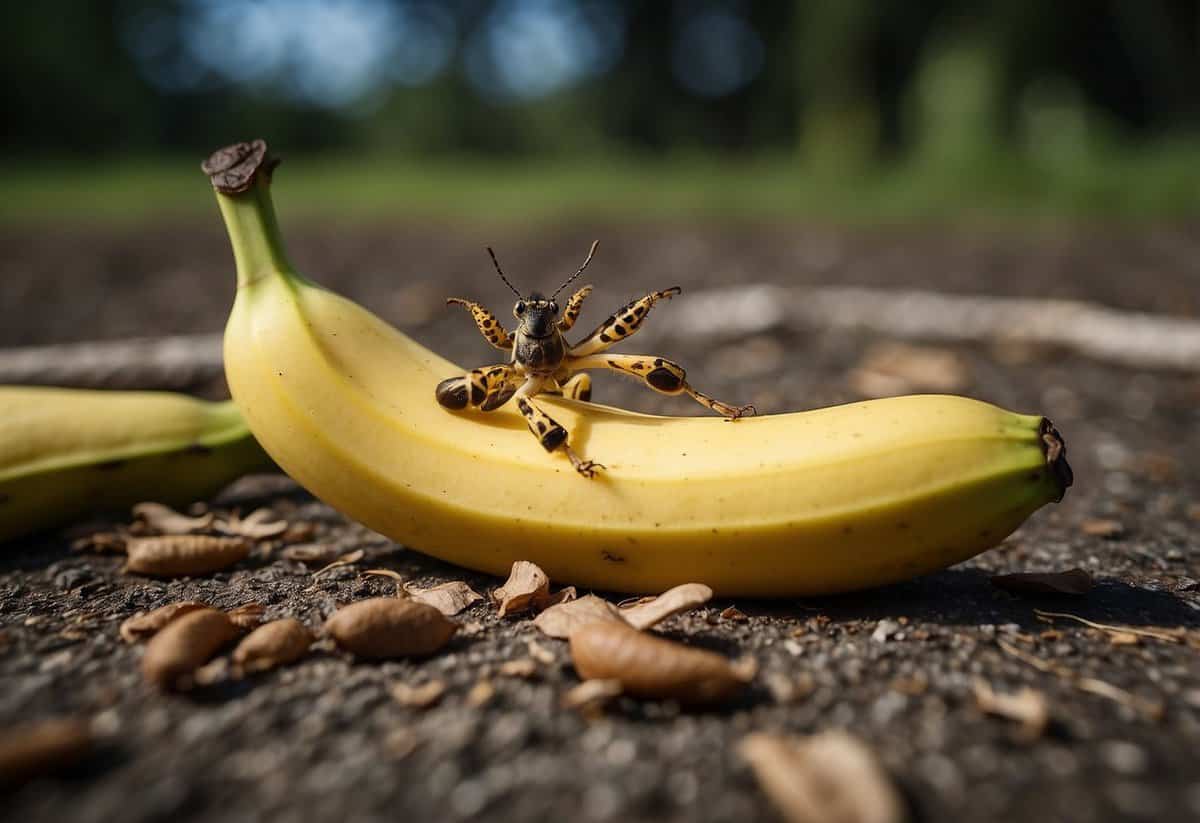
Not only are banana peels a cost-effective way to repel pests, but they also decompose and enrich the soil with nutrients. This can promote plant growth and improve the health of your entire garden. Using banana peels is a simple yet effective method to maintain an eco-friendly garden without relying on chemicals.
Imagine saving your plants from harmful insects while also reducing waste and improving soil quality. Using banana peels to repel pests checks all those boxes, making it a practical choice for any gardener.
Banana Peels in the Garden

Using banana peels in the garden can enhance the soil, help with composting, and even keep certain pests at bay. These peels are full of nutrients valuable to your plants.
As Organic Fertilizer
Banana peels are rich in potassium, phosphorus, and calcium, making them a fantastic organic fertilizer. When buried in the soil or brewed into a tea, the nutrients from the banana peel seep down to the roots, aiding in plant growth and health.
Potassium improves plant resilience to drought and disease. Phosphorus supports root development and flowering. Calcium strengthens cell walls. By incorporating banana peels into your gardening routine, you are reinforcing your plants from the inside out.
You can make a banana peel fertilizer tea by soaking peels in water for a couple of days. This liquid fertilizer can be poured directly on the soil around your plants. Chop the peels finely before burying them to speed up decomposition and nutrient release.
For Composting
Banana peels are a great addition to your compost pile because they decompose quickly and provide rich organic matter. As they break down, they release vital nutrients like magnesium, potassium, and phosphorus, which feed the microbes in your compost that break down other materials.
Chop the banana peels into smaller pieces before adding to the compost. This increases the surface area, allowing them to decompose faster. When added to compost, banana peels balance out green and brown materials, ensuring a healthy compost mixture.
Healthy compost leads to nutrient-rich soil, which boosts overall plant growth and soil health. So, don’t waste those peels—compost them!
Natural Pest Repellent Properties
Banana peels can also be used as a natural pest repellent. They contain compounds that deter certain pests, reducing the need for chemical pesticides. For example, chopping up banana peels and burying them just below the soil surface can keep aphids away.
The smell of banana peels is also said to deter insects like mosquitoes and fruit flies. However, place them carefully, as overripe peels might attract more pests than they repel.
For best results, monitor your garden to see if the banana peels are effective in repelling pests. You might need to adjust the method based on your specific garden needs.
Repelling Pests with Banana Peels
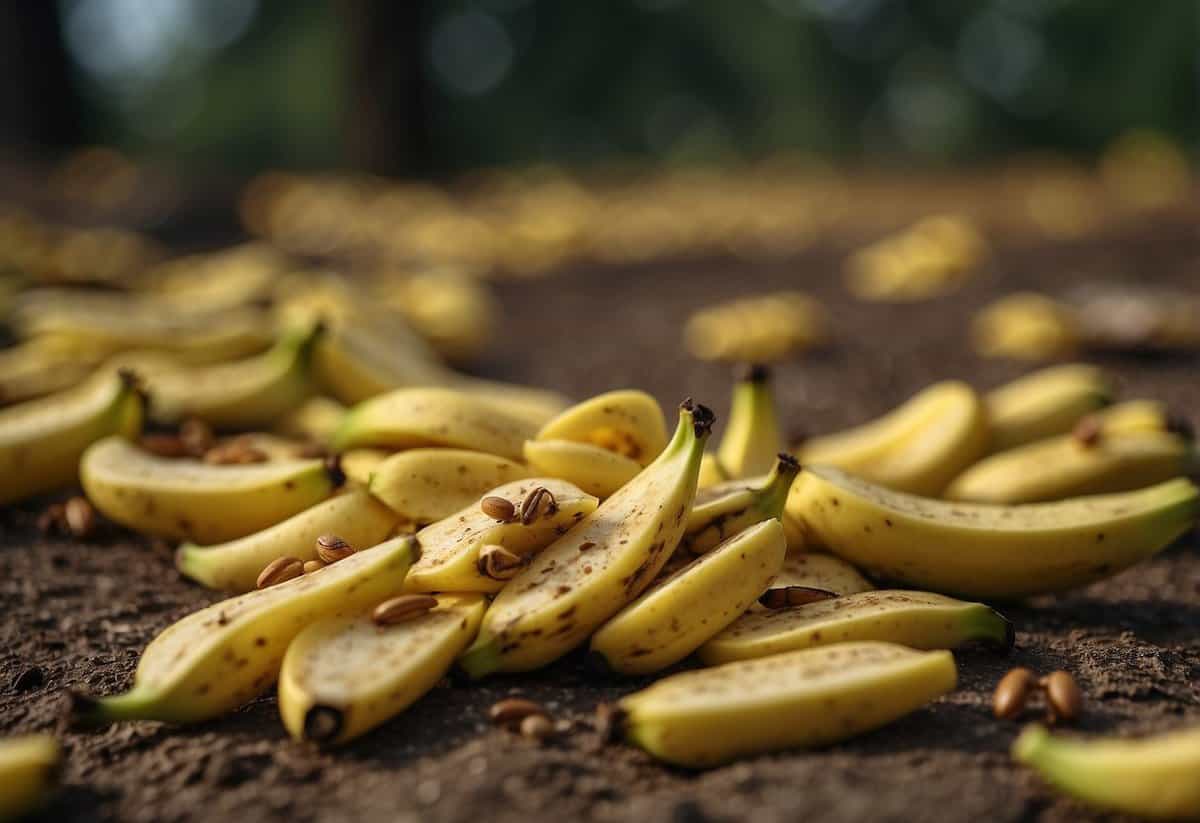
Banana peels can be surprisingly useful in your garden. They not only help in fighting off aphids but also keep away small animals and prevent insect infestations.
Deter Aphids and Protect Plants
Banana peels are effective in deterring aphids from your plants. Aphids are tiny insects that feed on plant sap, causing damage to leaves and flowers. By placing strips of banana peel around your plants, you can keep aphids away. The scent of the banana peel deters aphids, making your garden a less appealing place for them to stay.
To make a banana peel water solution, cut the peel into small pieces and soak them in water for 24-48 hours. This solution can be sprayed on plants. Alternatively, burying pieces of banana peel in the soil around your plants also deters these pests while enriching the soil with nutrients. This method provides a natural, chemical-free way to protect your plants from aphid infestations.
Keeping Away Small Animals
Banana peels can also help you in keeping small animals like raccoons and squirrels out of your garden. These animals are often drawn to gardens in search of food. However, the scent of banana peels can deter them. You can achieve this by burying chopped banana peels just beneath the soil surface.
It’s important to cover the peels with a thin layer of soil. This helps mask the scent enough to keep larger critters away but still provides the repelling effect. This method ensures that small animals are not drawing towards your garden, giving your plants the best chance to grow without being disturbed by curious animals.
Preventing Insect Infestations
Banana peels can also help in preventing infestations of other common garden insects such as fruit flies, fungus gnats, and even cockroaches. The peels create an environment that these pests find unappealing. In an organic garden, using banana peels offers a natural way to handle pest control.
Burying banana peels around the garden or using banana peel water can reduce the presence of these insects. This method not only keeps pests away but also serves as a fertilizer, enhancing the health of your plants. Pairing this method with other natural remedies like neem oil and beneficial insects like ladybugs can boost your garden’s pest resistance further.
Banana Peels as a Source of Nutrients
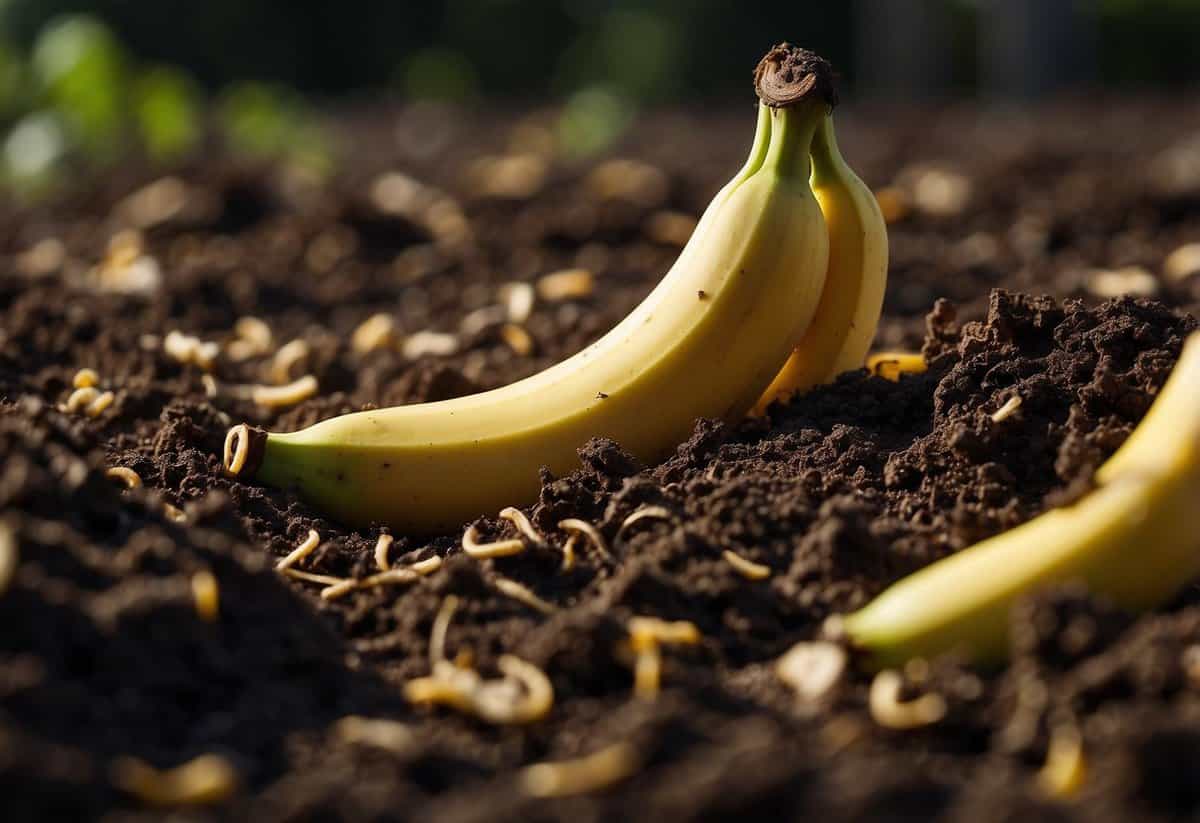
Banana peels are nutrient-rich and can boost plant health in various ways. They improve soil nutrition and also help seedlings and houseplants flourish.
Enriching Soil and Boosting Plant Nutrition
Banana peels are excellent for enriching soil. They break down and release important nutrients like potassium, phosphorus, magnesium, and calcium. These elements are essential for plant growth and strength.
For example, potassium helps plants develop strong stems and resist diseases. Phosphorus is vital for root development and flower production. Magnesium improves photosynthesis, and calcium strengthens cell walls.
To use banana peels, you can make banana peel water. Cut the peels into small pieces and soak them in water for 24-48 hours. Then, use this nutrient-rich water to water your garden. This method helps deliver nutrients directly to the roots of your plants.
Another way is to bury banana peels in your soil. As they decompose, they release nutrients that improve soil structure and fertility. These simple methods help create a thriving garden with minimal effort.
Helping Seedlings and Houseplants Thrive
Banana peels also benefit seedlings and houseplants. When you’re starting new plants, they need a nutrient boost to grow strong. Banana peels can provide this boost.
For seedlings, you can use banana peel tea. Soak banana peels in water for a few days and then use this liquid to water your seedlings. The tea provides essential nutrients that help young plants establish strong roots and vigorous growth.
For houseplants, placing small pieces of banana peel directly into the potting soil can be effective. As the peels break down, they slowly release nutrients, ensuring your houseplants get a steady supply. This can lead to lush and healthy indoor greenery.
In summary, incorporating banana peels into your gardening routine can greatly enhance the health and vitality of your plants.
Creative Uses of Banana Peels in Gardening
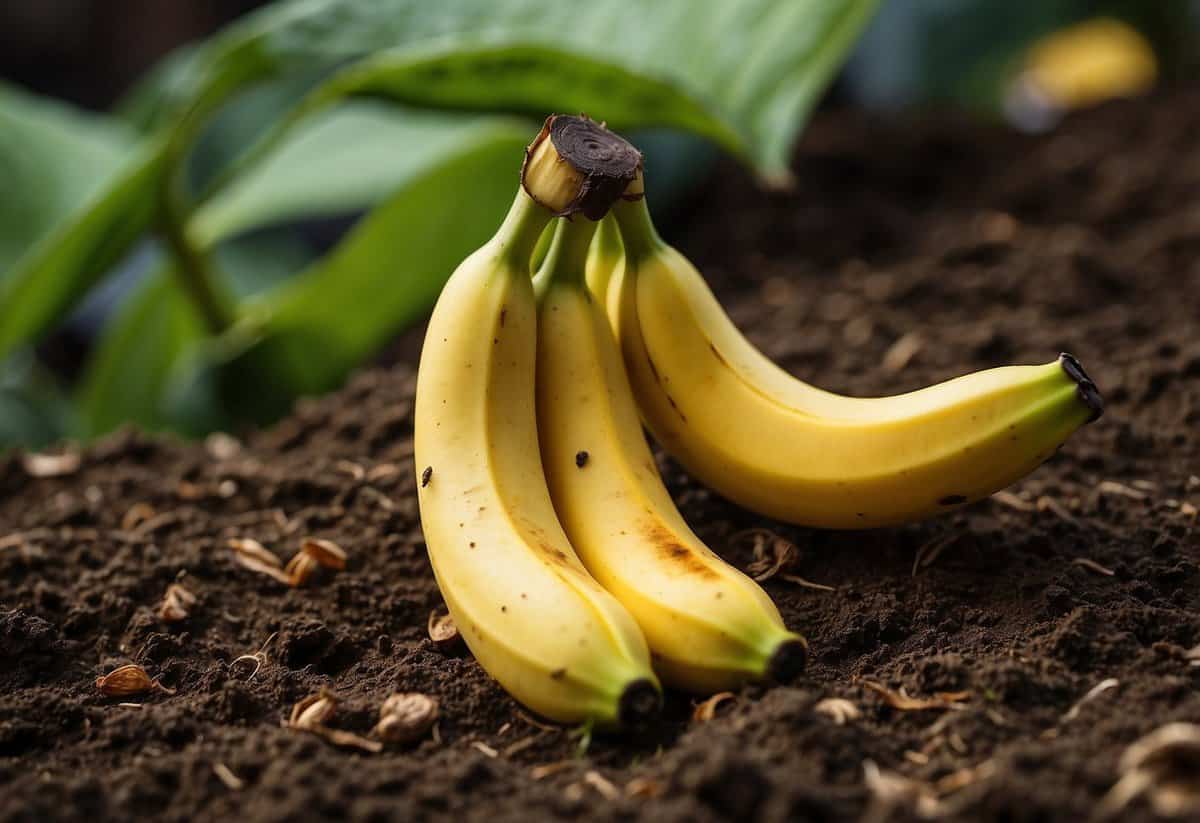
Banana peels can be a great resource for organic gardens. They are rich in essential nutrients like potassium and can help you create homemade fertilizers that promote plant health. Here are some creative ways to use banana peels effectively.
Making Banana Peel Vinegar for Plants
Banana peel vinegar can improve soil health and boost plant growth. To make this vinegar, you need banana peels, water, and a bit of time.
First, chop the banana peels into small pieces and place them in a jar. Fill the jar with water, ensuring the peels are fully submerged. Cover the jar with a cloth and let it sit in a warm place for a couple of weeks.
Stir the mixture daily. After two weeks, strain the liquid and transfer it to a clean container. The banana peel vinegar is now ready to use. Mix one part vinegar with four parts water and apply it to your plants. This enriches the soil with potassium, which is vital for plant health.
Crafting Banana Peel Smoothies for Garden Health
Creating a banana peel smoothie for your garden is simple and effective. These smoothies can be added directly to the soil to supply nutrients.
Blend banana peels with water until smooth. You can add other kitchen scraps like vegetable peels for extra benefits. Once blended, pour the mixture around the base of your plants.
These smoothies are rich in potassium, iron, and manganese, all of which are essential for plant growth. They also attract beneficial insects and microbes, promoting healthy soil. By regularly adding these smoothies to your garden, you support the overall health of your plants and soil.
Eco-Friendly Gardening Tips with Banana Peels
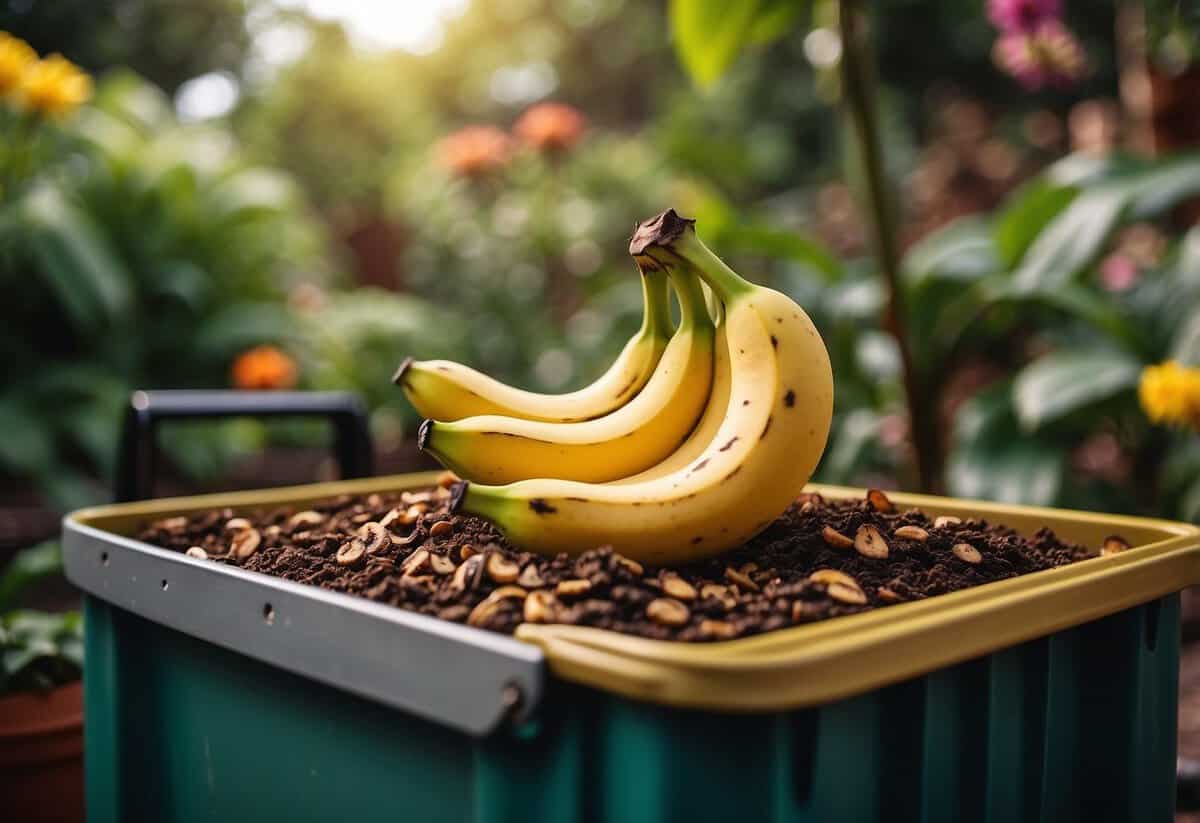
Using banana peels in your garden is a simple and cost-effective way to enhance your gardening experience. You can attract beneficial organisms and reduce waste by composting them effectively.
Attracting Beneficial Wildlife
Banana peels can help attract beneficial insects like butterflies and bees. Placing chopped banana peels near flowers can lure these important pollinators to your garden. This increases pollination and improves fruit and flower production.
Another way to use banana peels is by brewing banana peel tea. This natural solution can be sprayed on plants to strengthen them against diseases and pests, reducing the need for chemical pesticides.
You can also use dried banana peels to attract earthworms. Earthworms love the nutrients found in banana peels and will help aerate your soil, making it more fertile.
Reducing Garden Waste with Banana Peels
Banana peels are a great way to reduce garden waste by composting them. Chopping peels into small pieces speeds up the composting process, turning them into rich compost faster. Add these pieces to your compost pile to balance the nitrogen and carbon content.
Alternatively, you can make banana peel mulch. Spread chopped banana peels around the bases of your plants. This not only helps keep moisture in the soil but also slowly releases nutrients as the peels decompose.
Banana peels can also be made into a banana peel water fertilizer. Soaking banana peels in water for 24-48 hours creates a nutrient-rich solution that can be poured directly at the plant’s base. This method helps nourish the plants efficiently without chemical fertilizers.
Using these techniques will not only make your garden eco-friendly but also more vibrant and productive.







